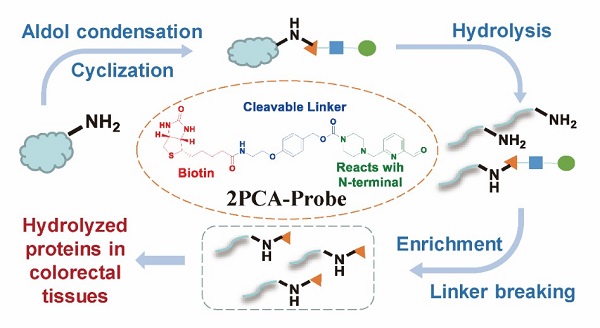Researchers Develop Probe for In-Depth N-Terminomics Detection
Proteolysis, an essential and irreversible process conducted by proteases, is fundamental to a wide range of biological functions. It plays a critical role in preserving cellular integrity by breaking down excess or improperly folded proteins. However, this process can become detrimental in the context of cancer, where it encourages aberrant cellular behaviors. Proteases, which are encoded by more than 500 genes in the human genome, are meticulously regulated in terms of expression and activation within healthy tissues. Unfortunately, in tumor environments, this regulation is frequently disrupted, resulting in accelerated tumor growth and metastasis.
In a study released in the Journal of the American Chemical Society on February 29, HUANG He and LIU Hong, along with their colleagues from the Shanghai Institute of Materia Medica (SIMM) of the Chinese Academy of Sciences, introduced a method for probing N-terminomics. By employing a cleavable 2-pyridinecarboxyaldehydes probe (2PCA-Probe), the team has considerably enhanced the precision and scope of N-terminal peptide detection and analysis. This advancement not only overcomes the hurdles faced by preceding methodologies but also uncovers a new marker for N-terminal chemical labeling, offering valuable insights into the associated reaction mechanisms.
In the examination of colorectal cancer and adjacent tissues, the team identified 4,686 unique N-terminal peptides. This discovery revealed a previously uncharted depth of the N-terminome, shedding light on the critical role of abnormal protein hydrolysis in the evolution and progression of cancer. By identifying differential patterns of hydrolyzed proteins between cancerous and adjacent tissues, the study highlighted the effectiveness of 2PCA-Probe's in unraveling the complex biochemical networks underlying cancer.
By offering a more comprehensive view of the N-terminome, the study not only enriched our understanding of proteolysis in cancer development but also paved the way for potential therapeutic targets and diagnostic markers. The utilization of the 2PCA-Probe as a tool for identifying N-terminal chemical labeling marked a pivotal point in the study of post-translational modifications, enhancing our ability to decode the intricate mechanisms of diseases.
DOI: http://doi.org/10.1021/jacs.4c02222

2PCA-Probe structure and label detection process (Image by SIMM)




